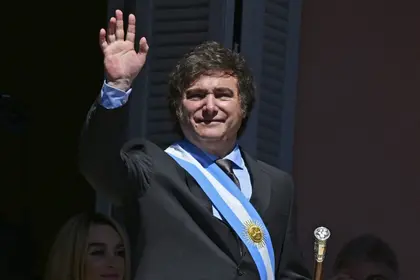On Dec. 10, the liberal economist Javier Milei assumed the presidency of Argentina. Milei’s appointment matters to Ukraine because he has confirmed to President Volodymyr Zelensky his political support in the wake of the Russian invasion.
Both have already held a bilateral meeting during which they designed a diplomatic agenda that would strengthen Ukraine's position in Latin America. Until Milei's arrival in the government, Zelensky did not have the support of the four most important countries in the region: Argentina, Brazil, Mexico and Colombia.
JOIN US ON TELEGRAM
Follow our coverage of the war on the @Kyivpost_official.
Milei assured Zelensky that Argentina would abandon the ambivalent position that former President Alberto Fernández had assumed and that it would support Ukraine in all international forums, from the UN to the G20.
In this context, Milei does not rule out making a lightning trip to Kyiv during the first months of 2024. Zelensky has already invited the new Argentine president, and now it is only a matter of coordinating the agenda of both leaders.
Who is Javier Milei?
Milei was born in the city of Buenos Aires on Oct. 22, 1970. His academic record includes a bachelor’s degree in economics from Belgrano University, a master’s degree in Economic Theory from the Institute of Economic and Social Development, and another in Economics from Torcuato Di Tella University. In Dec. 2022, he received an honorary doctorate from the Higher School of Economics and Business Administration.

N. Korean Troops Massed in Russia to Enter Ukraine War ’Soon’: Pentagon Chief
The son of a housewife and a passenger transportation businessman, he played soccer as a goalkeeper in the lower divisions of the Club Atlético Chacarita Juniors, and sang in the rock band Everest, which mainly played songs by The Rolling Stones.
Building on his interest and educational background in economics, Milei worked in the private sector until his entry into politics in 2021, at which point he was elected national representative for the city of Buenos Aires.
Milei has also been a professor of microeconomics, macroeconomics, monetary theory, financial theory, economic growth and mathematical economics, both in universities in Argentina and abroad. He is the author of more than 50 academic articles, nearly a hundred journalistic articles in the most important media in the country, and the author of 10 books, the last being “The End of Inflation.”
What will change under Milei’s presidency?
Milei’s arrival in the presidency not only means a change in the local politics of Argentina, but also in the country's foreign policy. His government aspires to solve the problems generated or aggravated by “kirchnerismo” – the name given in the country to left-wing populism beginning with the presidency of Néstor Kirchner (2003-2007), his wife Cristina Fernández de Kirchner (2007–2015) and Alberto Fernández (2019-2023), whose widow of the late former president was his vice president.
At the international level, Milei has pointed out on more than one occasion that he sees his international allies as the US and Israel. His friendships are distant and opposite to those of Kirchnerism, which in its last stage included China, Cuba, Nicaragua, Russia and Venezuela as political partners.
What about Argentina’s foreign policy?
Milei received Zelensky during his inauguration on his first visit to Latin America, in contrast to the refusal of the leaders of the Southern Common Market, whom, in July 2022, rejected Zelensky's request to participate in the organization's summit.
In addition to receiving the Ukrainian president, Milei received other leaders such as Santiago Peña (Paraguay), Vahagn Khachaturyan (Armenia), Luis Lacalle Pou (Uruguay), Gabriel Boric (Chile), Daniel Novoa (Ecuador) and Viktor Orbán (Hungary).
He also met with Jennifer Granholm, secretary of the US Department of Energy, and Israeli Foreign Minister Eli Cohen. Here it should be noted that, in addition to aligning with Israel, Milei, who professes the Catholic religion, plans to convert to Judaism. He also expressed his intention to move the Argentine embassy in the Asian country from Tel Aviv to Jerusalem.
In line with his geopolitical strategy, Milei excluded the following presidents from his guest list: Miguel Díaz-Canel (Cuba), Ali Khamenei (Iran), Daniel Ortega (Nicaragua) and Daniel Maduro (Venezuela), for being accused of violating human rights and supporting the Hamas and Hezbollah terrorist groups.
You can also highlight the text and press Ctrl + Enter






